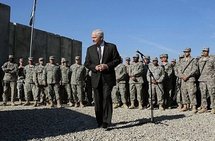Gates 'concerned' over Iran missile test: Pentagon
AFP
WASHINGTON- The United States on Wednesday voiced "concern" at Iran's latest missile test, calling it a "provocative" act that cast serious doubt over Tehran's claim of peaceful intentions.
Defense Secretary Robert Gates is "clearly concerned" by Iran's test of a medium-range missile, his press secretary told reporters.

Robert Gates (AFP/Pool/File/Justin Sullivan)
But the launch did not suggest a technological advance, he added.
"I don't think there was anything here that was particularly different from anything we've seen in the past," he said.
Iran test-fired the Sejil 2 (Lethal Stone) on Wednesday, which it described as a faster version of a medium-range missile that could allow it to strike Israel, drawing international condemnation.
Iran said the two-stage Sejil, powered by solid fuel, is capable of traveling 2,000 kilometers (1,240 miles), which would put arch-foe Israel, most Arab states and parts of Europe, including much of Turkey, within range.
The White House said the test would bolster international resolve to counter Tehran's nuclear ambitions.
"At a time when the international community has offered Iran opportunities to begin to build trust and confidence, Iran's missile tests only undermine Iran's claims of peaceful intentions," National Security Council spokesman Mike Hammer said.
"Such actions will increase the seriousness and resolve of the international community to hold Iran accountable for its continued defiance of its international obligations on its nuclear program."
The defiant missile test came as major powers considered imposing fresh sanctions against Tehran over its disputed nuclear enrichment program.
The United States and its regional ally Israel have not ruled out a military option to stop Tehran's controversial nuclear drive.
Tehran has in the past threatened to target US bases in the region and to block the strategic Gulf Strait of Hormuz waterway for oil tankers if its nuclear sites are attacked.
Iran is under three sets of UN sanctions for refusing to suspend enrichment and risks a further round after rejecting a UN-brokered deal to send its low enriched uranium abroad to be further refined into fuel for a research reactor.
The major powers negotiating with Iran on its nuclear program are to discuss the situation next week by telephone, probably on Tuesday, a US diplomat said, on condition of anonymity.
The missile test came a day after the White House defended President Barack Obama's effort to engage Iran.
Secretary of State Hillary Clinton had said nearly a year of offering dialogue to Tehran had achieved little progress.
But Obama spokesman Robert Gibbs argued that the strategy of initially offering an open hand had convinced world powers to form a united front against Tehran when it did not respond to the overture.
In Congress, a Republican lawmaker on Wednesday called on President Barack Obama to "immediately" rally the world behind a new round of punishing sanctions.
"This missile test raises the specter of danger to US national security interests," Eric Cantor, the number two Republican in the House of Representatives, said in a statement.
---------------------------------------------------------------------------------------------------------------------------------